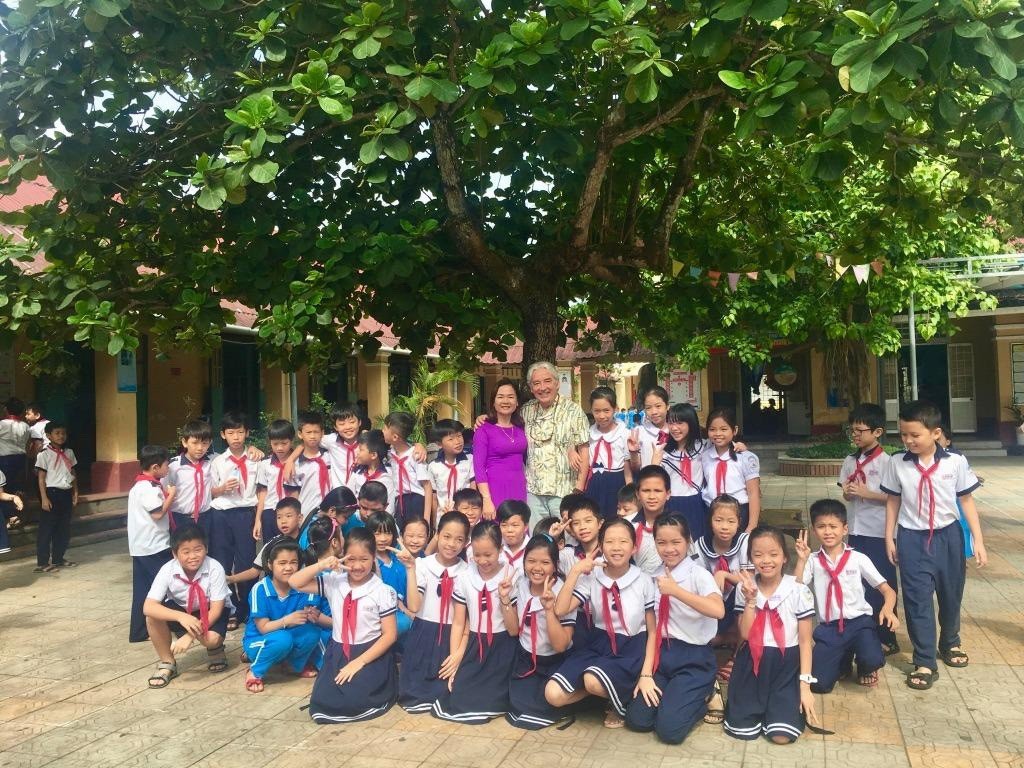
Dr. Ha Vinh Tho: 'Happy schools' should focus on moral values
Latest
Dr. Ha Vinh Tho, founder at Eurasia Learning Institute for Happiness and Wellbeing shared his opinion with the World and Vietnam Report.
 |
| Dr. Ha Vinh Tho. |
Everyone has their own way of feeling happiness. For you personally, what is the core essence of the Happy Schools?
When we speak of Happiness, we can distinguish two different dimensions:
One dimension of happiness has to do with pleasure and enjoyable experiences such as enjoying a nice meal or having a fun time with friends. This is of course valuable but it’s very personal, each person has its own way of enjoying and it is necessarily short lived. And of course, as human beings we cannot expect to always have fun and be in a good mood, we will face challenges in life and sometimes we must work hard or sacrifice some pleasure to fulfil our duties. Therefore, this is not the main aspect that we focus on in Happy Schools.
The other dimension of happiness is much deeper, it has to do with leading a meaningful life not only for oneself, but also in service of others, and to make valuable contributions to society. In Happy Schools, based on scientific findings and research, we define happiness as having three fundamental components:
To know how to take care of and live in harmony with oneself: self-knowledge, including emotional awareness, mindfulness, knowing how to deal with difficult emotions such as anger, sadness, jealousy, or fear. Knowing how to cultivate positive states of mind such as kindness, gratitude, and generosity.
To know how to take care of and live in harmony with others and society: developing social skills such as empathy, deep listening, compassion, true friendship, respect, and trust. Feeling responsible to contribute in a constructive way to community and society.
To know how to take care of and live in harmony with Nature and our Planet: Cultivating a deep connection with the natural world and our planet, being aware of the interdependence of all life forms, having a compassionate relationship with other species, making practical hands-on experiences in gardening, feeling empowered to contribute to a sustainable ecological future.
How do you see the happiness and pressure of Vietnamese children in schools today? What is your biggest goal when you bring Happy Schools to Vietnam?
The COVID pandemic has made visible and has worsened problems that were already present before. A recent survey identified 33% of adolescents as being at risk of depression in Vietnam, and this situation is similar in most other countries, including wealthy countries such as Switzerland.
According to recent survey by the OECD, the following are some of the factors that contributes the most to students’ wellbeing: The quality of the Teacher/Student relationship; A sense of belonging within the school community; Good cooperation between the students; Emotional support from parents
What has the worse impact on student’s wellbeing is bullying. Too much pressure and fear of failure are also causes of stress and even burnout.
We also know from evidence-based research that there is a strong correlation between wellbeing, social and emotional skills, and long-term performance.
Therefore, it is our goal to emphasize the importance of student’s physical, mental, and emotional wellbeing as a central task of the education system. It is also our objective to share practical methods and pedagogical tools to enhance both teacher’s and student’s happiness and wellbeing.
Education not only helps students pass exams but more importantly, teaches them how to feel, adapt and live happy lives. So according to you, what positive changes should be made in schools?
We live in a time of rapid changes and of disruption. The next generations will face unprecedented challenges, from climate change and ecological destruction to the rise of Artificial Intelligence and a complete remodeling of the job market, and of the workplace.
The current educational model is responding by and large to yesterday’s problems, but to face the future with confidence, we need to rethink the role, methods, and function of education, to equip the young people with the skills and competencies needed to meet these challenges.
The words of Andreas Schleicher, Director of Education at the OECD: "How can we prepare students for jobs that have not yet been created, to tackle societal challenges that we can’t yet imagine, and to use technologies that have not yet been invented? How can we equip them to thrive in an interconnected world where they need to understand and appreciate different perspectives and world views, interact respectfully with others, and take responsible action towards sustainability and collective well-being?"
To give but a few examples, how can we move from competition to collaboration, from logical data analysis to creativity and innovation, from narrow intellectual intelligence to multiple intelligence, from mere academic knowledge, to developing Head, Heart, and Hand in harmony?
Educating towards the three modes of care and harmony: with self, others and nature offer a practical path in this direction.
 |
| Educating towards the three modes of care and harmony: with self, others and nature offer a practical path in this direction. |
In order for students to feel happy when they go to school, teachers also need to change their thinking about education? In your opinion, what will be the biggest necessary change of teachers?
We have mentioned that the quality of the relationship between teachers and students is one of the key factors leading to the wellbeing of young people. For this to be possible, teachers must not limit their task to sharing knowledge and information. They must understand that in the age of the Internet, information is readily available at any given moment with just a few clicks on the smartphone.
Simply memorizing and testing if the information has been remembered is not enough. Students must develop self-knowledge, ethical values, critical thinking, creativity, ability to work in team and to solve problems together, social and emotional skills. Many tasks will be taken over by machines, and teachers must focus on the skills that are inherently human, and that machines will not perform. Teachers become coaches and mentors; they must embody themselves the values they want to promote in children. Restorative discipline should replace punishment, and a pedagogy of success, focusing on the strength and unique talents of students, rather than on their weaknesses and shortcomings create a positive class atmosphere that will benefit all.
What is the role of Principals in creating happy schools? What values should schools focus on?
Principals and education departments play a central role. The important changes that are necessary, can only happen if the teachers feel a strong support from their hierarchy. To be able to change the way we assess students, we must also change the way we assess teachers and schools. Good academic performances will always be important, but they are not enough, the ability to generate a positive classroom atmosphere, a feeling of belonging, emotional support, all these important factors must be part of the assessment of teachers.
Another important dimension that the education system should focus on is inclusion. The challenges that the future generations will face can only be addressed by collective effort and intelligence. Schools should not only serve the most talented ones, but make sure that no child is left behind, this includes children with special needs and disabilities. In nature, diversity is a sign of a healthy ecosystem, in the social field, it is similar, if we can include a diversity of perspectives, needs and abilities, the educational eco-system will be richer and more resilient.
Lastly, we should not forget the parents, the students, teachers, parents collaboration and mutual support is essential for positive changes to come about.

















